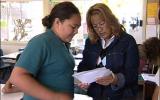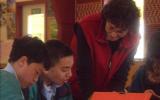Section navigation
Filter by result
Key collections
- [X]Te Mana Kōrero
Identity, language and culture
“Māori children and students are more likely to achieve when they see themselves, their whānau , hapū and iwi reflected in the teaching content and environment, and are able to be ‘Māori’ in all learning contexts.”
Ka Hikitia – Managing for Success: The Māori Education Strategy 2008-2012, page 20.
An education system incorporating identity, language, and culture values knowing where students come from and building on what students bring with them. The resources you will find on this page reflect the value of identity, language, and culture, and provide examples of this in the classroom and beyond.
-
Te Mana Kōrero: Culture counts 2
 28/06/2011
28/06/2011
Filed under: Productive partnerships | Identity Language and Culture | Ako | Effective teachers
Culturally responsive learning contexts are those where the learner can bring their own experiences into the classroom context. (Extract from ‘Te ManaKōrero: Relationships for Learning’, 2007).
-
Validating cultural knowledge
 28/06/2011
28/06/2011
Filed under: Productive partnerships | Identity Language and Culture | Effective leaders
Developing an inclusive curriculum. At Rotorua Lakes and Greymouth High Schools, student and whānau knowledge is validated through its introduction into the context for learning. (Extract from ‘Te Mana Kōrero: Strengthening Professional Practice’, 2005).
-
Culturally responsive practice
 28/06/2011
28/06/2011
Filed under: Productive partnerships | Identity Language and Culture | Effective teachers
At Ruawai Primary School and Kapiti College, whānau knowledge is valued as teachers construct contexts for learning that reflect the cultural significance and history of their location.
-
Te Mana Kōrero - Background 18/05/2011
Filed under: Productive partnerships | Identity Language and Culture | Ako | Effective teachers
The video clips for Te Mana Kōrero focus on the need to build, and sustain, strong and effective school-whānau partnerships, in order to raise Māori student achievement. Such partnerships are characterised by both parties respecting and valuing each other's perspectives and contributions.








